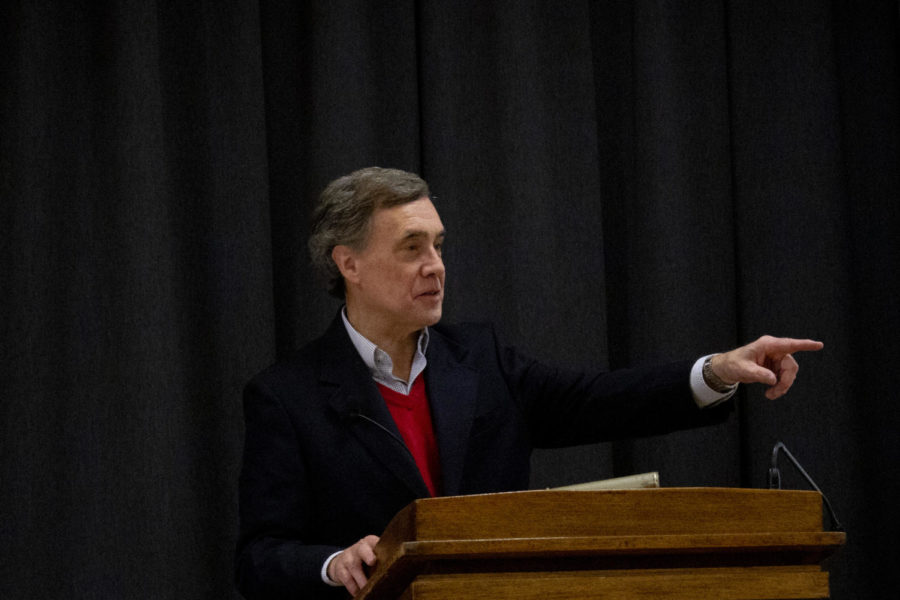Community tackles federal budget deficit in workshop
Kennedy DeRaedt/Iowa State Daily
David Oman, Senior Advisor to the Concord Coalition, leads a lecture and exercise, at the “How Would You Balance the Federal Budget?” event. Oman said, “When you’re done with this exercise the word fun might be in your vocabulary, normally you wouldn’t think of the national debt and the word fun in the same sentence or even on the same page.” The purpose of the event was to educate people on the complex federal budget and the compromises required to tackle the growing national debt. The two-hour workshop was held in the Sun Room of the Memorial Union on Jan. 31.
February 4, 2019
Students and residents gathered Thursday night for an interactive workshop that imitated the complexities of balancing a federal budget and the policy choices lawmakers face.
The workshop was facilitated by David Oman, senior adviser to the Concord Coalition and the former chief of staff for Governors Robert Ray and Terry Branstad. He kicked off the presentation with a brief history of U.S. debt.
Oman correlated spikes in debt to the economic costs of war, going as far back as the Civil War. Oman, unable to identify a current war, turned to the audience looking for answers to the steady deficit increases in recent years.
“There is no war. There is no stock market crash,” Oman said. “The reason that [the deficit] is going up right now, in a healthy economy … is because there is no consensus in Washington.”
Budget projections for 2019 are sitting at $897 billion, a $118 billion increase from 2018, according to the congressional budget office.
“Among the two parties, the two branches of government, they just spend like their drunken sailors,” Oman said.
Oman further contextualized the reality of the deficit, citing Iowa’s seven and a half billion dollar budget.
“Our federal government burns through that much money in about 15 or 16 hours,” Oman said.
The audience was split into six groups, each containing five to seven members. Each group selected a “chairman” who was given a packet of information on the policies up for debate.
With 90 minutes to attempt to reduce the deficit, groups decided which policies to keep and which to throw. Policies fell into four categories: General government spending; national security and defense spending; health care and social security; and taxes and revenues.
Despite controversy, everyone could agree that the exercise, in all its complexity, still oversimplified the consequences of making sweeping all-or-none policy decisions.
When one group was faced with the choice to raise premiums for parts of Medicare in order to cover 35 percent of program costs, dilemmas appeared.
“As an old person, I say that we are not paying our fair share. It is unsustainable. I’m gettin’ real well and these kids aren’t,” Ames resident Lee Huey said.
In response, Charlie Weber, a resident of Ames, acknowledged that there are a lot of seniors living on social security alone who would not be able to afford raising the price of premiums.
“We can’t arbitrarily make a 331 billion dollar reduction,” Weber said.
Concluding the workshop, the chairman of every group took the podium to share their group’s results. One group reduced government spending by 1 trillion dollars while another found 4 trillion dollars to cut.
Despite the large range of results, every group cited difficulties in coming to a consensus, particularly on health insurance and Supplemental Nutrition Assistant Program policies.
The exercise drew attention to the space our elected officials occupy when their goals of re-election, justly representing their constituents and decreasing government spending come into conflict.
“The challenge with all this is these numbers are so staggering, no one can put their arms around it,” Oman said. “They [congress] just kick the can right off, we screwed it up let the next guys do it. And the next guys might be you.”

















